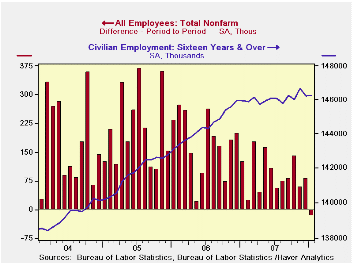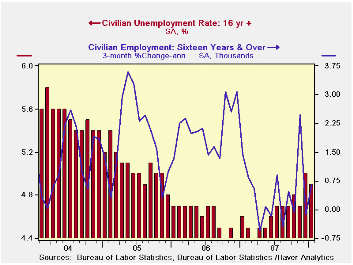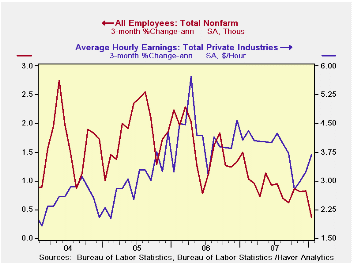 Global| Feb 01 2008
Global| Feb 01 2008U.S. Payrolls Fell Unexpectedly, Revisions & Jobless Rate Down Slightly
by:Tom Moeller
|in:Economy in Brief
Summary
The Bureau of Labor Statistics reported that nonfarm payrolls fell in January by 17,000 versus expectations for a rise of 70,000. In December, the rise payrolls was revised to a stronger gain of 82,000, but November's increase was [...]

The Bureau of Labor Statistics reported that nonfarm payrolls fell in January by 17,000 versus expectations for a rise of 70,000. In December, the rise payrolls was revised to a stronger gain of 82,000, but November's increase was halved to 60,000. Moreover, the gain for all of last year was revised down slightly to 1.1% from the 1.3% reported earlier.
The decline in jobs during January was the first since August 2003. Five years ago, job declines continued through 2002 & 2003 though economic recession ended in November 2001.
Fewer jobs in government accounted for the outright decline in overall January employment. An 18,000 worker decline (+0.8% y/y) in gov't jobs overall owed to a 24,000 worker decline (+0.1% y/y) in state gov't jobs. That left employment in private industries last month to rise a negligible 1,000 (0.7% y/y) but a similar preliminary reading for December was revised up to a gain of 54,000.
In the private service sector employment rose by a weak 52,000 (1.4% y/y) although December's increase was about doubled to 115,000. Professional & business services jobs fell by 11,000 (+1.6% y/y), the first material m/m decline since 2004. Temporary help services jobs fell 9,000 (-3.3% y/y). Retail employment rose 11,200 (0.4% y/y) but jobs in finance fell 2,000 (-1.1% y/y), the eleventh decline in the last thirteen months (Here is where the earlier job numbers were revised down sharply.)
Jobs in education continued firm and rose 15,700 (3.1% y/y) while job gains in the health care sector also were strong and rose 30,900 (3.1% y/y). Jobs in the leisure & hospitality sector have been strong as well and rose 19,000 (2.7% y/y) in January.
Factory sector payrolls fell another 28,000. Construction employment fell as well, by 27,000, which was the seventh consecutive monthly drop.
Continuing to portend weakness in job creation was one month diffusion index of 46.2%. This measure of the breadth of job creation amongst industries was at its lowest level since 2003.
The unemployment rate slipped to 4.9% last month after the jump to 5.0% in December. Household employment rose 37,000 (0.2% y/y) while the labor force fell 42,000 (+0.6% y/y). Unemployment fell 79,000 (+7.6% y/y) but the labor force participation rate rose to 66.1%, its highest since last June.
Average hourly earnings rose 0.2%. Factory sector earnings jumped 0.5% (2.9% y/y) and private service-providing earnings rose 0.2% (4.0% y/y).
| Employment: 000s | January | December | November | Y/Y | 2007 | 2006 | 2005 |
|---|---|---|---|---|---|---|---|
| Payroll Employment | -17 | 82 | 60 | 0.7% | 1.1% | 1.8% | 1.7% |
| Previous | -- | 18 | 115 | -- | 1.3% | 1.9% | 1.7% |
| Manufacturing | -28 | -20 | -3 | -1.9% | -1.9% | -0.5% | -0.6% |
| Construction | -27 | -45 | -57 | -3.6% | -1.0% | 4.9% | 5.2% |
| Average Weekly Hours | 33.7 | 33.8 | 33.8 | 33.9 (Jan. '07) | 33.8 | 33.9 | 33.8 |
| Average Hourly Earnings | 0.2% | 0.4% | 0.3% | 3.7% | 4.0% | 3.9% | 2.7% |
| Unemployment Rate | 4.9% | 5.0% | 4.7% | 4.6% (Jan '07) | 4.6% | 4.6% | 5.1% |
Tom Moeller
AuthorMore in Author Profile »Prior to joining Haver Analytics in 2000, Mr. Moeller worked as the Economist at Chancellor Capital Management from 1985 to 1999. There, he developed comprehensive economic forecasts and interpreted economic data for equity and fixed income portfolio managers. Also at Chancellor, Mr. Moeller worked as an equity analyst and was responsible for researching and rating companies in the economically sensitive automobile and housing industries for investment in Chancellor’s equity portfolio. Prior to joining Chancellor, Mr. Moeller was an Economist at Citibank from 1979 to 1984. He also analyzed pricing behavior in the metals industry for the Council on Wage and Price Stability in Washington, D.C. In 1999, Mr. Moeller received the award for most accurate forecast from the Forecasters' Club of New York. From 1990 to 1992 he was President of the New York Association for Business Economists. Mr. Moeller earned an M.B.A. in Finance from Fordham University, where he graduated in 1987. He holds a Bachelor of Arts in Economics from George Washington University.
More Economy in Brief
 Global| Feb 05 2026
Global| Feb 05 2026Charts of the Week: Balanced Policy, Resilient Data and AI Narratives
by:Andrew Cates






